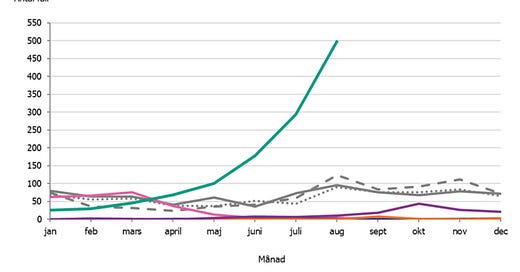The Public Health Agency of Sweden, or Folkhälsomyndigheten has reported a total of 1,236 cases of whooping cough, or pertussis have been reported this year through August 31. This is an increase of 67 percent since July 31 when 739 total cases were reported.
This is the most cases reported in a single year in the past 10 years.
Cases were reported from 21 regions. The majority (65 percent) of the cases have been reported from the Stockholm region, Skåne and Västra Götaland.
109 pertussis cases were among children under 1 year of age.
Whooping cough is caused by the bacterium Bordetella pertussis. The bacterium attaches and grows on tissue in the respiratory tract and secretes a poison (exotoxin) that is important for the symptoms. The infectious agent is found in the respiratory tract of the person who is sick and is spread as droplet infection during coughing attacks. Contagiousness is very high.
The incubation period is usually one to two weeks, but can be up to three weeks.
Whooping cough typically starts as a cold with a cough and possibly a mild fever. The cough then increases and comes in an attack-like manner and gradually becomes more and more intense.
After a few weeks in connection with the coughing attacks, children may also have difficulty breathing (wheezing) and may turn blue (cyanotic) in the face from lack of oxygen. The coughing attacks often end with the child coughing or vomiting mucus. Primarily infants may become unconscious during the attacks due to lack of oxygen. They usually regain consciousness within seconds. Eventually the coughing attacks subside, and the illness is usually over after a total of about six weeks. In adults, whooping cough usually presents as a prolonged cough.
If you get sick despite vaccination, the disease is usually milder for children and adult children who have been vaccinated against the disease.
The disease is sometimes complicated by pneumonia which is due to infection with some other bacteria. Mortality in Sweden has been low in recent decades thanks to many children being vaccinated.
Since 1996, all infants have been offered vaccination at the age of three, five and twelve months, with a booster dose at the age of 5 and 14-16 (children born from 2002).
The vaccination is given in a combination vaccine with vaccines against other diseases included in the vaccination program for children.
Subscribe to Outbreak News TV on YouTube
From August 2022, vaccination against whooping cough is recommended during every pregnancy to provide protection to the child from birth. The vaccination for pregnant women is given in the form of a vaccine against tetanus, diphtheria and whooping cough.
Infants exposed to whooping cough should be given antibiotics for prevention. Older children with younger siblings under one year who get whooping cough should be treated with antibiotics to reduce the risk of spreading the infection.
Whooping cough is a very serious disease for young children. Right now, a large spread is taking place. Here's how to protect your child from infection.
You who are pregnant:
Get vaccinated against whooping cough. Then your child is also protected. Talk to your midwife about where you can get vaccinated.
You who have children:
Vaccinate your child against whooping cough at the Children's Health Center (BVC).
Avoid children under 6 months meeting people with runny nose and cough.





